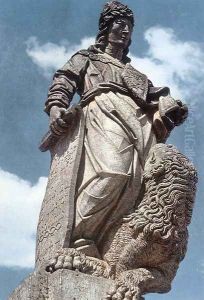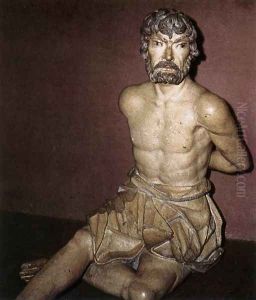Antonio Francisco Lisboa Paintings
Antonio Francisco Lisboa, better known as Aleijadinho, was a Brazilian sculptor, architect, and woodcarver, widely regarded as one of the most important figures in Brazilian Baroque art. Born in 1730 in the town of Vila Rica, now Ouro Preto, in the state of Minas Gerais, he was the son of a Portuguese carpenter named Manuel Francisco da Costa Lisboa and his African slave, Isabel. Aleijadinho's mixed heritage in a colonial Brazilian society influenced both his life and his art.
Aleijadinho's work is characterized by its detailed and emotive forms, blending elements of the European Baroque with indigenous and African influences. Despite suffering from a debilitating disease, believed to be leprosy, which led to the loss of his fingers and toes, Aleijadinho continued to create his masterpieces, often holding tools strapped to his deformed hands. His condition earned him the nickname 'Aleijadinho,' which translates to 'Little Cripple.'
Among Aleijadinho's most significant contributions to art and architecture are the churches and other religious buildings in Ouro Preto and the surrounding areas of Minas Gerais. His works include the Church of São Francisco de Assis in Ouro Preto, which is adorned with elaborate carvings and statues, and the Sanctuary of Bom Jesus de Matosinhos at Congonhas, where his famous 'Twelve Prophets' - soapstone sculptures of Old Testament figures - stand.
Aleijadinho's influence extends beyond his artistic creations; he is also celebrated for his role in developing a distinctly Brazilian identity in the arts during a time when the country was still a Portuguese colony. His legacy has endured, and he remains a source of national pride and cultural significance in Brazil.
Aleijadinho passed away on November 18, 1814, in Ouro Preto. Despite the limitations imposed upon him by his illness, his extraordinary body of work has left an indelible mark on the history of art. Today, Aleijadinho is remembered not only for his artistic genius but also for his perseverance in the face of adversity. His works continue to be studied and admired for their technical skill, emotional depth, and cultural importance.


